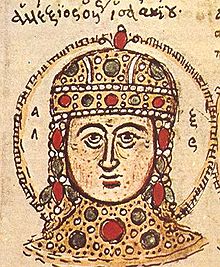Alexius IV
| Alexios IV Angelos | |||||
|---|---|---|---|---|---|
 |
|||||
| Emperor of the Byzantine Empire | |||||
| Reign | 1203–1204 | ||||
| Predecessor | Alexios III Angelos | ||||
| Successor | Alexios V Doukas | ||||
| Born | circa 1182 | ||||
| Died | 8 February 1204 | ||||
|
|||||
| Dynasty | Angelos | ||||
| Father | Isaac II Angelos | ||||
| Mother | Irene | ||||
| Full name | |
|---|---|
| Alexius IV Angelus |
Alexios IV Angelos or Alexius IV Angelus (Greek: Αλέξιος Δ' Άγγελος) (c. 1182 – 8 February 1204) was Byzantine Emperor from August 1203 to January 1204. He was the son of Emperor Isaac II Angelus and his first wife, an unknown Palaiologina, who became a nun with the name Irene. His paternal uncle was Emperor Alexius III Angelus.
The young Alexios was imprisoned in 1195 when Alexios III overthrew Isaac II in a coup. In 1201, two Pisan merchants were employed to smuggle Alexius out of Constantinople to the Holy Roman Empire, where he took refuge with his brother-in-law Philip of Swabia,King of Germany.
According to the contemporary account of Robert of Clari it was while Alexius was at Swabia's court that he met with Marquis Boniface of Montferrat, Philip's cousin, who had been chosen to lead the Fourth Crusade, but had temporarily left the Crusade during the siege of Zara to visit Philip. Boniface and Alexios allegedly discussed diverting the Crusade to Constantinople so that Alexios could be restored to his father's throne. Montferrat returned to the Crusade while it wintered at Zara and he was shortly followed by Prince Alexios's envoys who offered to the Crusaders 10,000 Byzantine soldiers to help fight in the Crusade, maintain 500 knights in the Holy Land, the service of the Byzantine navy (20 ships) in transporting the Crusader army to Egypt, as well as money to pay off the Crusaders' debt to the Republic of Venice with 200,000 silver marks. Additionally, he promised to bring the Greek Orthodox Church under the authority of the pope. The Venetians and most of the Leaders were in favour of the plan however some were not and there were defections, including Simon of Montfort. In 1202 the fleet arrived at Constantinople. Alexios was paraded outside the walls, but the citizens were apathetic, as Alexios III, though a usurper and illegitimate in the eyes of the westerners, was an acceptable emperor for the Byzantine citizens.
...
Wikipedia
